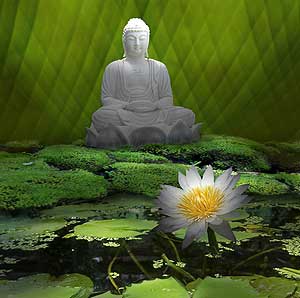Dialectic and the Buddhist Theory of Names
by Aik Theng Chong, The Buddhist Channel, Aug 10, 2011
Singapore -- Buddhist fundamental principle attached to the beliefs that there are two and only two sources of knowledge, one is our senses and the other is our understanding. One is the source of Reality and the other, Ideality. The first is running and the second is stable.
 The first is point-instant the second is concept or simply Logic. Reality is unintelligible and unutterable, it is consists of particulars. Ideality is indirect, or conditional, a reflex of Reality in Concepts and Images and an expressions of the Universals. Judgment is a
The first is point-instant the second is concept or simply Logic. Reality is unintelligible and unutterable, it is consists of particulars. Ideality is indirect, or conditional, a reflex of Reality in Concepts and Images and an expressions of the Universals. Judgment is a
function that link together Reality and Ideality.
The unutterable reality can nevertheless be designated indirectly in Speech and by Names. But names can only touch reality dialectically. This is the act of Buddhist Nominalism, which is also termed the act of ‘Buddhist Dialectical Method’ by some.
What is indeed the part of language that is in our cognition? Is it a real source of knowledge? Is it different from the senses and the intellect? To the Buddhist logicians, language is not a separate source of knowledge and names are not the adequate or direct expressions of reality. Names correspond to image or concept and they are the expression only of the Universals.
They are not the reflex of Reality itself since reality is consists of particulars and not the
universals. The universals cannot be reached in purposive actions, just as in concepts and names they are indirect, a conditional reflexes of reality, not real but is logical. Knowledge can be direct or indirect, either originating from the senses or in the intellect, either perception (sensation) or inference (conception). Knowledge derived from language and words are not direct, it is not sensation, it is indirect knowledge through inference and an indirect mode of cognition of reality.
The senses are affirmation the intellect is dialectical and is always negative. The word ‘white does not communicate the cognition of all white objects. They are infinite. It refers to a line of demarcation between white and the non-white, which is cognized in every individual case of the white.
The white is cognized through the non-white and the non-white through the white. The negation is mutual. To have an Origin means the negation of Eternity and Eternity means the negation of Origin, so does the opposition of good and bad, hate and love, etc.
Everything that is created by the understanding is created in couples. They are relative to each other and mutually negate each other. A jar and a piece of cloth are opposed indirectly to each other inasmuch as the cloth falls into the category of non-jar, We might asked, why is the name of Negation given to image which does not seem to be negation at all? This is because image itself appears only owing to its being distinguished from other images and is a negation of them. The connection between the real thing and the name is indirect and causal.
We first experience internally the thing as it is presented to our senses. A word is then indirectly connected to the external thing which is an indirect way of cognizing the particular object by distinguishing it from all dissimilar things.
Reality alone is affirmation, it is non dialectical. As stated above, there are two sources of knowledge, from our senses and our intellects, they are not only related direct and indirect they are also related as affirmation and negation, as a non-dialectical and a dialectic source. According to Dignaga, names are negative due to the natural dialectic of the human Intellect.
Conceptual thought are namable thought, names originate in concepts and vice versa, concepts can originate in names. All concepts and the names expressing them are negative because they express their own meaning through a negation of the contrary.
One of the reasons, the Theory of Names come about is as a critique directed against opinion that the Universal (concepts, thoughts) is a real entity residing in a particular and can be cognized directly by our senses. To the Buddhist logician, the Universal embraces an infinite number of particulars, which cannot be cognized directly.
These Universals existed only in our head and are the product and construction of our productive imagination which is essentially negative, relative and dialectical.
When Speech and Names have the characteristic of religious veneration, where Word was an eternal positive Entity existing in an eternal union with the things denoted by it, where Word was first of all the word of the Holy Scripture; It becomes impossible for a follower of such belief system to accept a theory which reduces names to mere conventional negative signs of differentiation.
No would someone who believes that the positive meaning of words was established by God, look approvingly or favorably upon it too. Fortunately, for a Buddhist, concepts, words, and names are just tools and means, i.e. an aid for the faithful to get onto the right path to Nirvana and on reaching it, discarded.

 The first is point-instant the second is concept or simply Logic. Reality is unintelligible and unutterable, it is consists of particulars. Ideality is indirect, or conditional, a reflex of Reality in Concepts and Images and an expressions of the Universals. Judgment is a
The first is point-instant the second is concept or simply Logic. Reality is unintelligible and unutterable, it is consists of particulars. Ideality is indirect, or conditional, a reflex of Reality in Concepts and Images and an expressions of the Universals. Judgment is a